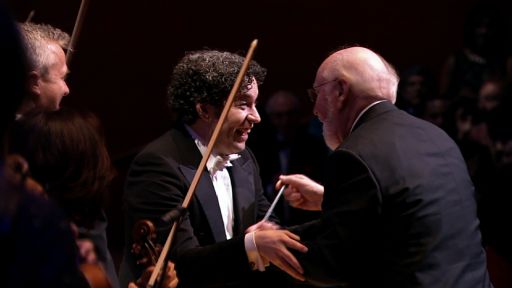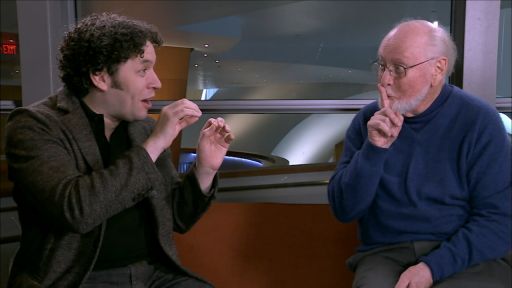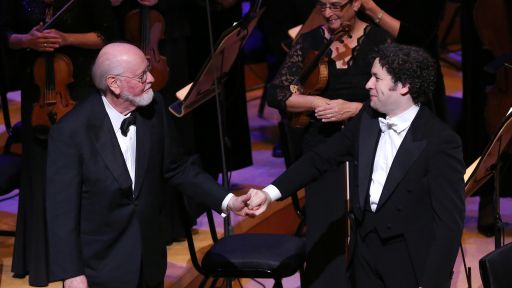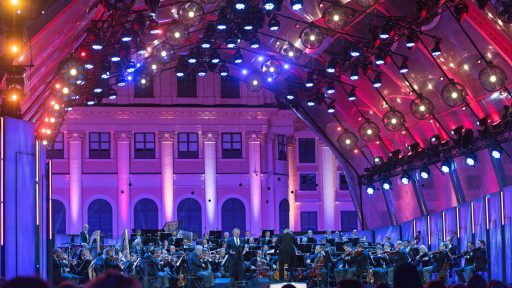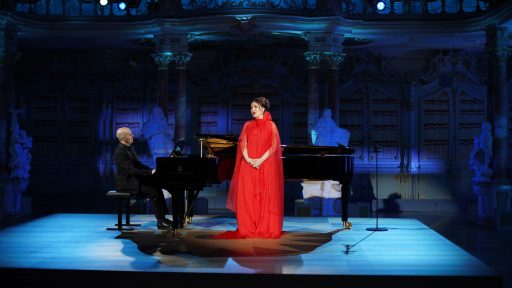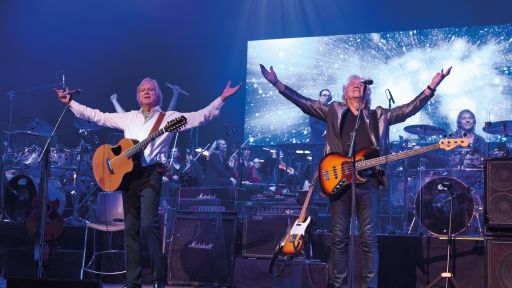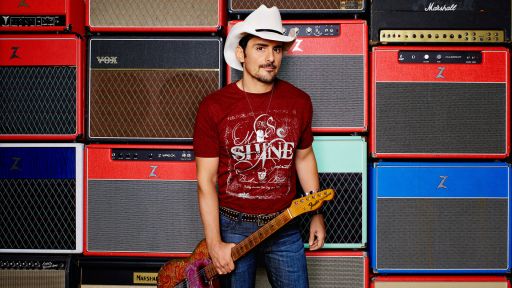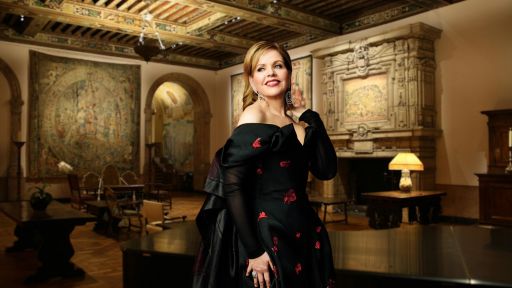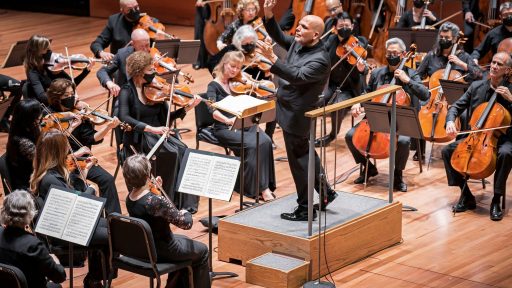In March 2009, John Williams’ composition for Great Performances premiered as its theme music during the opening credits of Great Performances: King Lear, starring Ian McKellen. This is the first time Williams created a composition for a THIRTEEN production. David Horn, executive producer of Great Performances, approached the Academy Award-winning composer about creating a new theme as the crowning element for the series then-new look.
“After 36 years of showcasing the best in the performing arts for American audiences, we wanted to reinvigorate our Great Performances broadcast identity,” said Horn. “As one of America`s master composers with an unmistakable musical signature, John Williams is his own brand name for excellence and innovation. When the opportunity came up to create a new opening to the series, John was automatically our first choice – we didn’t think twice.”
Williams’ work earned Great Performances a 2009 Emmy Award for Best TV Theme Song. The theme is played at the start of every broadcast.
Hear John Williams’ 2009 Emmy Award-winning theme song for Great Performances (1 min, 18 seconds):
John Williams has scored many American classic films such as Jaws, Fiddler on the Roof, Star Wars, E.T., Jurassic Park, Catch Me If You Can and continues to move audiences with music that heightens the drama, suspense and emotion of cinematography. Tune in to Great Performances on July 24, at 9 pm to celebrate John Williams’ compositions in a concert performed by the L.A Philharmonic and conducted by Gustavo Dudamel.
Great Performances Interview with John Williams
David Horn, executive producer of Great Performances, interviewed John Williams at Royce Hall in Los Angeles, CA, on February 10, 2009.
David Horn: So we’re here at Royce Hall at the campus of UCLA, your alma mater. What are your favorite memories of this place?
John Williams: Well, my first great memory of Royce Hall is the fact that I attended a concert, one or two or three here, where Stravinsky conducted, and I remember seeing him in this room on this stage, conducting and performing…And then we have recorded in here. Some film scores with Steven Spielberg. We recorded A.I., a few years ago and Memoirs of a Geisha. We recorded here with our great soloists Yo-Yo Ma and Itzhak Perlman. So, I remember [Royce Hall] not only [as] a place where I’ve had great memories and connections with my early days, but more recent days of working in the room and loving the sound of the room. And the opportunity to do the theme for Great Performances gave me another chance, I thought, to bring the orchestra to this hall and enjoy playing here and having the benefit of what we hope was a good recording here.
David Horn: When did your involvement with music begin? In New York, or when you came to Hollywood?
John Williams: I first began studying music, if I can call it that, in the 1930s as a piano student. I’ve always had good teachers…who were colleagues of my father…[I] worked seriously at the piano through my teenage years and studied with Rosina Lhévinne at Juilliard briefly in the early middle ’50s, both in New York at the Juilliard School and later out here at the old Los Angeles Conservatory on Figueroa Street, where she used to come give master classes in the summer. But I also played the trombone, and picked up trumpets and various instruments, even scrubbed on a cello occasionally. I had an orchestration teacher, Robert Van Epps, who was always explaining to me that in order to understand the orchestra, you need to play one member of each group of the orchestra – a wind, a string, a percussion, a brass, well enough to sit in a school rehearsal…Those were among the greatest lessons that I’ve had in my life…
David Horn: You have a unique relationship with Steven Spielberg for many years. Can you tell me about the genesis of that relationship?
John Williams: I’ve been working with Steven Spielberg for now, I think 35, going on 36 years, which is amazing. It’s [like] any kind of collaboration, artistic or otherwise, that would be probably record-setting for people to be so patient with each other and collaborate so comfortably on such a variety of subjects. It speaks, I think, a lot about Steven Spielberg and his character, first of all. He’s a very loyal man in every aspect of his life. Devoted to family, devoted to fellow artists and fellow workers…I met Steven Spielberg in the early ’70s at Universal Studios. We were introduced by the late Jennings Lang, who was an executive at Universal, who asked me if I would have lunch with this young 23-year-old man who had done a picture with Goldie Hawn called, Sugarland Express. I met Spielberg for lunch. We went to a very fancy restaurant in Beverly Hills, where we had lunch, and I could tell that it was the first time he’d ever poured a bottle of wine in his life. He didn’t seem to quite know what to do (laughs)…But the remarkable thing about that lunch was, aside from the order of the bottle of wine which neither of us drank anyway, was the fact that he’d already memorized scores that I had written. The Cowboys and The Reivers, you know, the William Faulkner piece and other things, TV themes that I had forgotten myself that he could hum. “This is so-and-so’s theme from such-and-such a film.”
So, part of the answer about the permanence of our relationship has to be the fact that he loves music and is interested in it. I have to say that one of the greatest good pieces of good fortune in my life has been meeting Steven Spielberg and having a relationship with him that’s been so harmonious and so productive for such a long time.
David Horn: Can you tell me a little bit about what you did together on Close Encounters and how you got to where you ended up?
John Williams: Well, Close Encounters, for me, is a magical film still. I don’t know how many people watching this will remember the film. But basically, the film is about the arrival of extra-terrestrials…and they’re very beautiful and very friendly…Probably the first time ever in science fiction films where the aliens weren’t horrifying monsters.
One of the ideas of the film was that since we couldn’t speak to them in our language, we didn’t think we could speak to them with changing light board…or maybe we could communicate with them with a kind of a musical Morse code. Fanciful idea. And the script called for, and Steven insisted that it should be five notes. (whistles) Some five notes. And I remember writing all manner of seven note motifs. Seemed to me that when you got beyond five notes, to six or seven, it was not any longer a signal, but that was a melody. The difference between a melody and a signal, if you like.
So, it was agreed and settled on the fact that it would be five notes, this beginning communication. And I remember writing, I think it’s accurate to say, about 350 examples of what five notes could be, with no rhythmic variation. Five single notes played this way, four notes here and one there, etc.
I wrote these 300-plus, and I kept playing over them for Steven…We never got to the point where we’d say, “Eureka! That is absolutely the one.” It was more that there seems to be a greater pull toward this one. I have no way of explaining why that motif was the most successful…All of that communication was done on a keyboard synthesizer and pre-recorded, so that you could slow it down, the colored lights that we see on the screen could be activated by the keyboard. So in a sense, in a fanciful sense, it was a communication by sound, music, and by lights, color, and a synchronized effect of the two.
I would just say for people, musically you have (whistles) that last note, it goes from the tonic, which is the resolution of the pitch, to a fifth, which in linguistic terms, it’s a little bit like…ending a sentence on “but” or “and,” there’s a comma there or a colon or something…There’s a sort of an expectancy created by hanging that unresolved musical phrase up, and it may be one of the reasons why it’s inviting. Because you want, you need to resolve it, i.e., you need to hear a bit more.
David Horn: What was your approach to the Great Performances theme?
John Williams: Well, I love the opportunity to write a theme for Great Performances, and I’m grateful to [you] for this opportunity, whose idea I think it was to have an orchestra perform the theme of the program.
Certainly, all or most serious music lovers will feel very indebted to Great Performances. Television, broadly speaking, is a great gift to us and a great instrument, and we can hear presidents and prime ministers speak and be in their presence almost and see and watch and hear great artists perform.
Much on television we would hope we can improve in the fullness of time, perhaps we will see those improvements come along. But Great Performances has been unique in that it has allowed precious moments that have been captured on film in the past and coming up to the present to be distributed around the world for people to see.
You can hear and see Maria Callas sing, for example…A program series like we have in Great Performances…is a great gift to music lovers and the broader public. For me, the opportunity to do a new theme for the opening and closing of the program is a privilege and an honor and I have enjoyed writing what I’ve done for it. My feeling about it is that it basically should be a lyrical and celebratory piece. That is, that’s positive and promises something in the next hour that’s gonna be exciting and that may also have the service of a function of arresting our attention at the beginning, and calling us to the viewing site and hopefully people will learn it and make an association with it if we’ve been successful. [It’s] a lovely opportunity to frame musically and melodically the diverse repertoire that’s available in this program.

